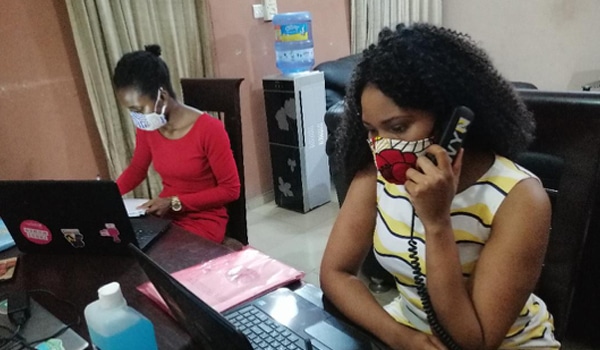
by Sybil Nmezi, Generation Initiative for Women and Youth Network (GIWYN), 22 May 2020
Background
In Nigeria, where abortion is legally restricted except to save a woman’s life, the Covid-19 pandemic has led to more limited and complicated sexual reproductive health and abortion services. As the spread of the virus increases quite quickly, the number of people who test positive has been increasing daily. Schools, companies and society have implemented the lockdown strategy in both the formal and informal sectors, including the recommendation to work from home (for office workers) to limit the pandemic. Almost 200 million people, 49% of them women, stocked their homes with goods for more than four weeks, as a strategy to prevent the spread of the virus. In this situation, GIWYN has continued to manage the Ms Rosy Hotline, working from home to increase access to reproductive health information and services. Access to information on effective contraception, abortion options and essential medicines is one of the most cost-effective, practical community interventions that will help to reduce unintended pregnancy and deaths that are preventable. For women to have access to the reproductive health services they need, the hotline has become vital, particularly with the health care system overburdened.
The impact on the hotline model
The hotline is a practical community intervention that offers information on reproductive health. Prior to the Covid-19 pandemic, the hotline was receiving approximately 2,700 calls per month from across Nigeria. When the pandemic started here, the hotline had an influx of calls, increasing to 3,020 per month, a 16% increase. This was due to concerns about potential disruptions to health and other facilities, resulting in limited health services. In addition, since women and girls are forced into close contact with their abusers due to lockdown, based on the experiences women shared, 65% were reporting incidents of domestic violence and/or marital rape, without reliable access to contraception, and unprotected sexual activity as well, which can potentially lead to unintended pregnancies and to forced pregnancies, followed by the need to seek termination of pregnancy. Hence, information provided through the hotline becomes essential. During the lockdown, the hotline number was redirected to an alternative local number in order to continue to reach women and girls who need access to information. Overall, the hotline incorporated information on a range of self-care interventions. According to the World Health Organization (WHO), self-care is the ability of individuals, families and communities to promote health, prevent disease, maintain health, and cope with illness and disability with or without the support of a healthcare provider. This information has helped women to manage their own pregnancies and reduce unsafe abortion at home. We have urged all hotline staff, members and partners to keep watch on their physical and mental health as we go through this Covid-19 period.
Obtaining medications and accessing resources
Due to the abrupt restrictions in the entire system, so as to prevent sharing of infection, clients of the hotline faced more difficulties than usual in obtaining products, accessing resources and obtaining referrals. The provision of many services and obtaining many products became more challenging, including for women and girls. As businesses closed, people were not able earn wages to be able to buy products and resources. Our attention was drawn to this when as many as 20% of women and girls who sought information from the hotline complained of the unavailability and/or the unaffordability of products in their local pharmacies and stores. For some 35% of them, it took two to three days before they could access the medicines they needed. Those referred to clinics for services were afraid to attend these clinics, as the health system became overwhelmed with the need to treat Covid-19 patients, while sexual and reproductive health and right issues were de-prioritised. The danger for those who required access to services to prevent unwanted pregnancy and reduce unsafe abortion, and at the same time to keep themselves healthy, were finding it difficult to leave their homes to get medication in the lockdown environment. In other cases, we found that even health workers were unwilling to continue working without necessary items, such as personal protective equipment. Because many patients with Covid-19 have needed intensive care, many people are not willing to attend health facilities and hospitals where there were patients, for fear of contacting the virus.
Conclusion
In line with the WHO Director-General’s recent remarks on Covid-19, our country should strike a fine balance between protecting health, minimising economic and social disruption, and respecting human rights. Women’s choices and rights to sexual and reproductive health care, however, should be respected regardless of their Covid-19 status. All of us at GIWYN and our partners are advocating that governments should expand their priorities for Covid-19 prevention and treatment by using a feminist approach.



